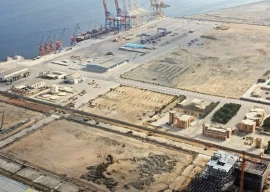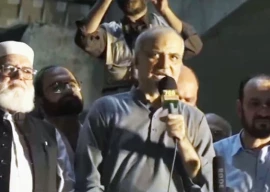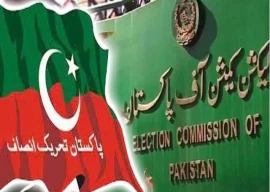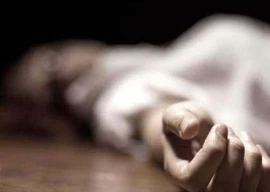
Given this situation of total helplessness, the demand for ‘army action’ seems to be gaining ground. The industrialists of Karachi, who provide the economic backbone to Pakistan, have joined other citizens in calling for ‘army intervention’. The President of the Federation of Pakistan Chambers of Commerce and Industry has formally said: “Given the grave circumstances where civil law-enforcement agencies have failed in restoring peace in Karachi, which has now become a hub of bloodshed, the army must be called in as it is the last resort to enforce peace in the city.” Of course, senior police officers are still making reassuring noises in the wake of the most shocking ambush against their men, but the truth is that the people of Karachi have lost all faith in the civilian law-enforcing elements even though they are reinforced with paramilitary forces.
It is all very well to talk about calling in the military but it is important to first carefully scrutinise the situation that it will be required to handle and how the ‘interventions’ of the past that happened in the early 1990s could be repeated successfully in the Karachi of today. It is crucial to study the sociology of a city where ethnic warriors are actually representing two entities, the ethnic group they pretend to represent and the political party that has encouraged the development of a frozen ethnic vote and which provides them refuge from the arm of the law. Also to be kept in mind would be the financial aspect of the current war: no matter who is doing the fighting, using expensive sophisticated weapons requires money; therefore the army will not only be confronted with bhatta-extorting mafias but also well-armed terrorists. The army will, sooner or later, find itself in a situation where it will have to confront the people themselves. This will happen eventually given the state of the city and with dozens of people being killed every day, with no semblance of government and with public anger and frustration because of this inaction running high. Remember the city is engulfed in no ordinary disorder; and will the army officer in charge of the situation order the opening of fire on these citizens?
The last time the military was asked to step in, the then army chief refused and presented an awkward conditionality: I will have to set up my own courts manned by my own mid-level officers; and the punishments they hand down will not be struck down by reviewing judges already swooning with fear. When this situation arose, the elected government recalled periods in national life when martial laws were imposed on the nation and military courts dished out unfair penalties to persons perceived by the generals as ‘enemies of the state’. In addition to this scary jurisprudence of ‘assistance to civilian rule’, there is another question to consider. The Pakistan Army is busy fighting the terrorists in the tribal areas in battles that remain inconclusive because of their non-military nature. It is also standing up to the rest of the world in the political interpretation of what the intra-state conflict in Pakistan is all about. It may be unwise to ask it to embroil itself in the conflict of Karachi. This is something that the political parties need to sort out themselves because, as much as they contribute to the problem, the solutions lies with them.
Published in The Express Tribune, August 21st, 2011.
COMMENTS (10)
Comments are moderated and generally will be posted if they are on-topic and not abusive.
For more information, please see our Comments FAQ













Army has indulged a lot in civilian matters. The current mess in which we are is mainly due to the military rule and military interventions in the civilian matters. Keep military away from the internal affairs. It has not helped in the past, it would not help now, rather would make things worse. Continuous democratic process, de-weaponisation, rule of law, efficient administration and application of high tech. measures is the answer to control crime and terrorism.
@gen musharaf was best. love u pak army . plz take over. hate democracy because we dont deserve it
agree with qasim.. no need to give this sham democracy a chance esp if feudal families are running the show.. im sick of ppl saying give it a chance.. if ur loved ones die u wud not be defending this sham concept.. bring in martial law/caretaker system comprised of professional intellectuals.. establish the basic fundamental requirements of democracy.. such as education and then think of democracy.. for now the country is craving leadership and stability.. something which the army can provide.
For God's sake should we let the mayhem continue just because of political fallouts of army deployment? Unless proven otherwise, nation expect the the Army, its officers and cadres to be honest enough to implement impartial peace and justice. Don't preach politics and democratic solutions at the cost of human deaths; go ask the affected families.
@Tango_News
If I'm not wrong Cautious is an expat Pakistani.
That said, you need to understand the difference between Riots and Target Killings. Riots happen swiftly and for a short time which is hard to control. Target Killings are everyday gang wars.
Whether Gujarat govt and police stood watching the riots taking place is still in the courts. You should also keep in mind that hundreds of Hindus were also killed in those riots. If police were pro-Hindu they would have saved Hindu families.
@Cautious: You need to be cautious what to say. Do I need to remind you Gujarat 2002 genocide!!. In your "largest secular democracy" where thousand of Muslims were slaughtered while your government and police "watched the events taking place and took no action against the attacks on Muslims and their property". So cut your democratic and alliance crap of India, USA, and Israel. It is not relevant here.
Please shift to Karachi with your children and family then rewrite this piece of advice .
We have been telling the world for a couple of years that we cannot open new fronts in the War on Terror because we are overstretched and do not have the resources. How are we going to deploy troops in an urban jungle, where the enemy is no one and everyone at the same time?